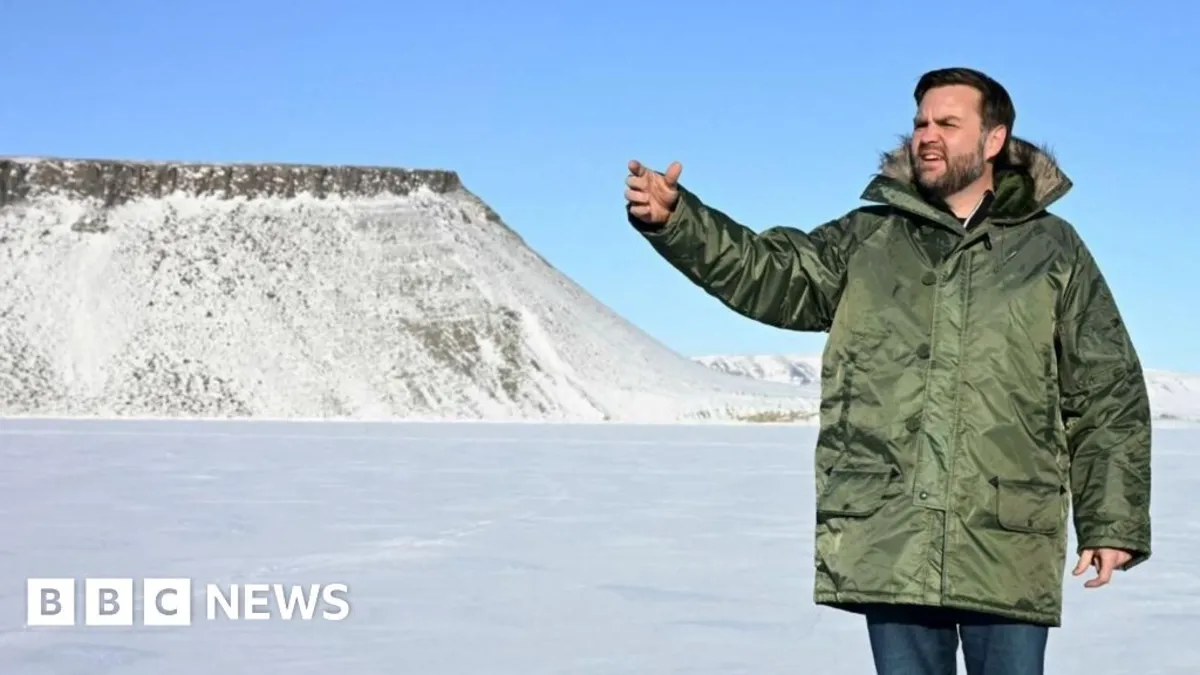
On a chilly Friday evening in Nuuk, Greenland, a breathtaking green shimmer lit up the night sky, marking the appearance of the northern lights. This stunning natural phenomenon coincided with a pivotal moment for the island, as it faced significant geopolitical challenges from a foreign power. During a brief visit to a remote U.S. military base in northern Greenland, U.S. Vice-President JD Vance delivered a striking message that underscored the urgency of Greenland's situation.
Despite attempts to soften the tone of his message, Vance's overarching narrative remained alarming. He emphasized that the world, particularly the Arctic region, is undergoing rapid change, and that Greenland must acknowledge the threats posed by an expanding China. Vance remarked, “We need to wake up from a failed, 40-year consensus that said that we could ignore the encroachment of powerful countries as they expand their ambitions.” His warning was clear: Greenland cannot afford to remain passive in this shifting landscape.
Vance's comments highlighted the significance of Greenland's mineral wealth and strategic location. Analysts now view the island as a critical player in an emerging power struggle among the U.S., China, and Russia for control over the Arctic's resources and shipping lanes. The Vice-President suggested that the only viable path for Greenland to safeguard its interests is to distance itself from Denmark and embrace a more assertive relationship with the United States.
Vance's remarks did not sit well with Denmark. Danish Prime Minister Mette Frederiksen voiced her discontent, describing Vance’s statements as “not justifiable.” This response reflects the growing tension between traditional alliances and the U.S. approach under the Trump administration, which has seemingly abandoned long-standing partnerships, including NATO.
Meanwhile, in Nuuk, a contrasting atmosphere prevailed as locals celebrated the formation of a new coalition government. Residents gathered joyfully, singing, “We will prevail,” a testament to their resilience and unity. This local event served as a powerful reminder of the values that underpin Greenland's predominantly Inuit population: a commitment to consensus, the preservation of their culture, and a desire for respect from external powers.
Under its new government, Greenland is embarking on a cautious journey toward full independence from Denmark, a process that requires careful negotiation with both Copenhagen and Washington. There is a collective understanding among Greenlanders that they must enhance their economy to support this aspiration while safeguarding against potential exploitation by external commercial interests.
During his visit, Vice-President Vance acknowledged Greenland's quest for self-determination. He asserted that the U.S. aims to foster a partnership that respects Greenland's sovereignty. “Our message is very simple,” Vance stated, “yes, the people of Greenland are going to have self-determination. We hope that they choose to partner with the United States.” If this approach is genuine, it could alleviate some of the anxiety felt by Greenlanders regarding the U.S. intentions.
Despite the goodwill that exists towards the U.S., many in Nuuk remain puzzled by the aggressive stance of the Trump administration. Greenlanders are aware of the mutual benefits that can arise from a cooperative relationship, particularly in terms of security. The existing treaty with Denmark allows the U.S. to bolster its military presence in Greenland without necessitating any drastic actions.
However, the urgency displayed by the Trump administration raises questions about its long-term strategy. Rather than fostering a respectful and gradual partnership, many feel that the U.S. is resorting to intimidation, which has already led to the cancellation of a planned cultural tour by Vance's wife, Usha, in response to local protests.
As Greenland navigates its path toward independence and self-determination, the need for a more respectful and patient engagement from the U.S. is vital. The island's unique position in the Arctic and its rich resources warrant a thoughtful approach, one that prioritizes the voices and aspirations of the Greenlandic people. A cooperative, behind-the-scenes strategy would likely yield more fruitful results than aggressive posturing, fostering a relationship built on mutual respect and understanding.